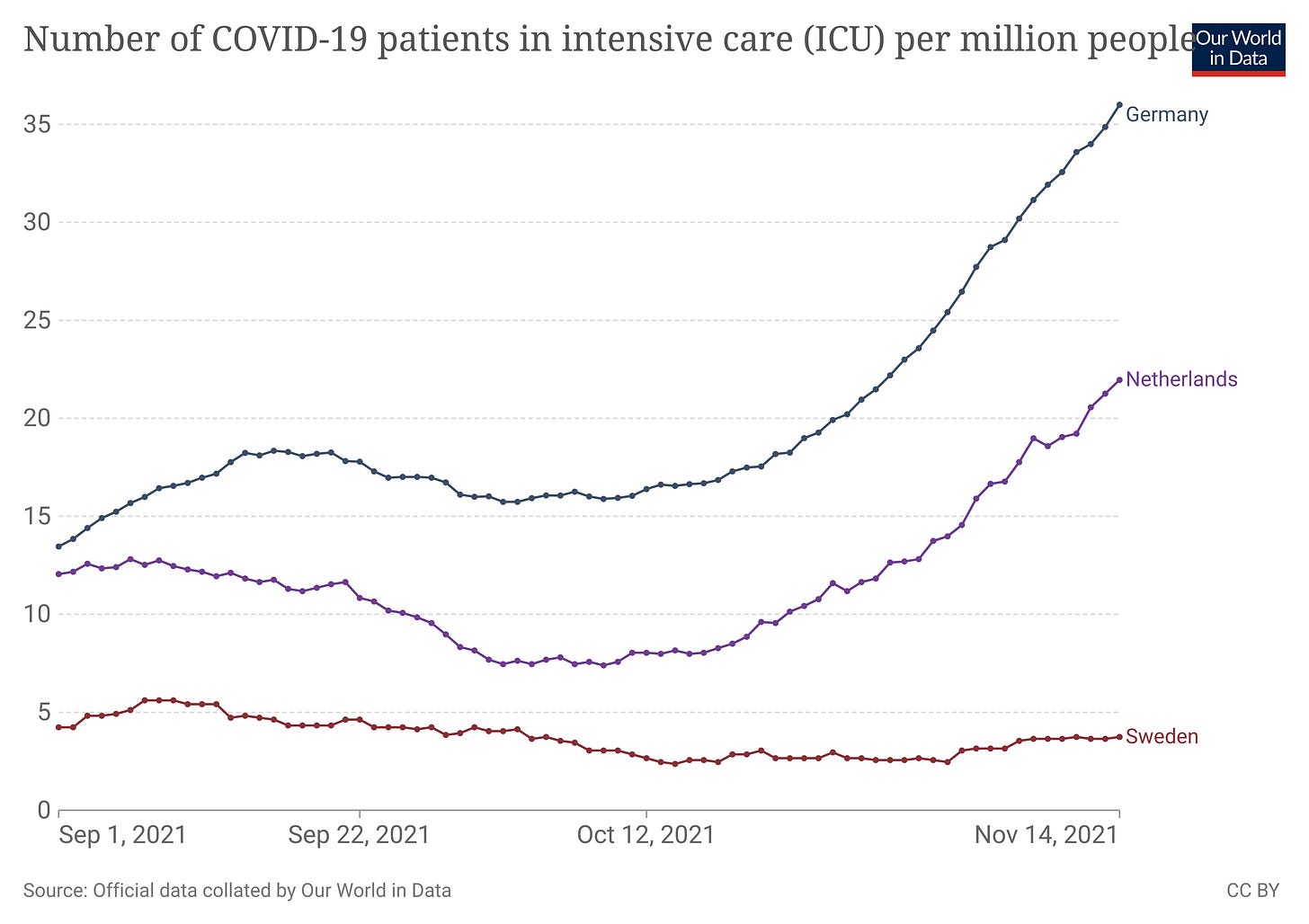Netherlands Preparing To Ration Healthcare
No Other Choice?
The Netherlands is considering denying care to some critically ill patients if a new lockdown is not implemented.
The head of the national association of intensive care units, Diederik Gommers, appealed Tuesday night for a tough lockdown, including closing schools, something the government has been keen to avoid.
He told a committee of lawmakers that the country's hospitals are 10 days away from being so overburdened with COVID-19 patients that intensive care doctors will have to start making choices about which critically ill patients get care.
A Grim Picture
The data does paint a grim picture, with cases on the rise for the past few weeks, and at a worse rate than neigboring Germany.
ICU patients are similarly rising, although not as bad as in Germany.
And Then There Is Sweden
Yet it should be noted that Sweden is not experiencing the same rise in infections or ICU patients. Sweden has avoided lockdowns thus far, which makes their experience highly instructive for the Netherlands.
Most notably, Sweden has a marginally lower inoculation rate, yet the infection rates are completely different.
Even more striking is the Netherlands and Sweden have very similar reproduction rates. By rights, their case curves should be on a similar trajectory.
With Sweden having a considerably better time with COVID-19 than the Netherlands, the question ”Why?” is inevitable.
Is Sweden reaping the benefits of its “natural immunity” approach early on? That remains a distinct possibility, and if so underscores the potency of natural immunity vs inoculations against COVID-19.
One thing is certain: the inoculations are playing no role in the trajectory of the pandemic in either Netherlands or Sweden. With similar inoculation rates and highly dissimilar daily case rates, it is a proven reality the inoculations are simply not a factor (the recent European outbreak as a whole should be the final nail in the inoculation coffin).
What Other Choice Is There?
Which brings us back to Diederik Grommer's call for a lockdown, and his assertion that there is no other alternative.
He said the only way to ease pressure on ICUs is “to ensure that the admissions go down very fast. And the fastest way of reducing (admissions) is tough measures and I think that means a strict lockdown. And that includes schools because I think if you don’t close schools you don’t stop infections.”
The “only way” out is strict lockdown?
Given the example of Sweden, it is absolutely certain that lockdown is not the only way out.
The example of Sweden shows that other options exist. Yet Netherlands health officials seem unaware or perhaps it is uninterested in those other options.
What other options might there be?
In the realm of therapeutics, there are, of course, Ivermectin and Hydroxychloroquine. These two drugs first gained credibility as antiparasitics. However, as has been explored innumerable times (including here), both drugs have a growing body of evidence attesting to their efficacy against COVID-19.
As of this writing, Ivermectin has to its credit:
67 studies total
46 peer reviewed studies.
31 Randomized Controlled Trials
As of this writing, Hydroxychloroquine has to its credit:
364 studies
266 peer reviewed studies
46 Randomized Controlled Trials
Both drugs have been used for decades, and have known safety profiles.
Even if the research is wrong about these drugs, what has the Netherlands to lose from trying them now?
In the realm of prophylaxis, vitamin D supplementation has to its credit:
142 studies
89 sufficiency studies
53 treatment studies
If the hospital situation is truly as dire as reported, surely giving these treatments and prophylactics a chance is a viable choice. If the alternative is no care for some, any supposed downside to these treatments is mooted--in such circumstance, there is truly nothing to lose.
Is turning to these treatments a desperate choice? The data says otherwise, but even if it were, it is still a choice.
As is so often the case, the rationale for sacrificing random lives and livelihoods of “no other choice” is patently and demonstrably false.






